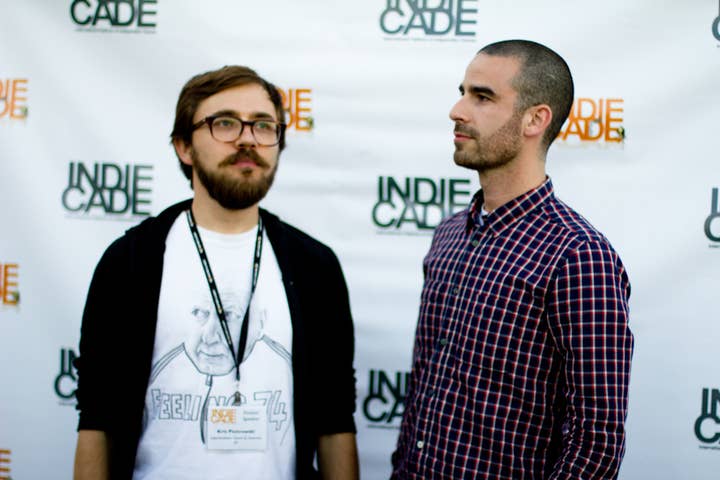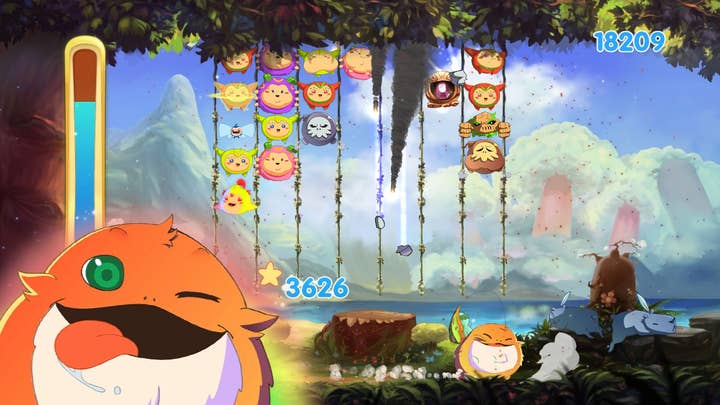Capy Games: The Indie Survival Guide
How do you get noticed among hundreds of thousands of alternatives? Capy Games' Nathan Vella has a suggestion or two
Capy Games is the independent developer getting it right. At least, that's what everyone is telling Nathan Vella, the company's co-founder and president. But as flattering as it must be to hear the words he knows they don't tell the whole story.
"Yeah, sure," he smiles, eyes still bleary from the Nordic Game Conference's climactic party the night before. "We've just started to get it right."
Capy Games was founded (as Capybara Games) by Vella and two friends in 2004. It was a world without iPhones or Androids, a world without PlayStation Networks and Xbox Live Arcades, a world where aspiring independent developers had their typical surfeit of passion and and a troubling deficit of options.
"If you make something nobody hates then nobody really wants it. I like that we created something for a certain type of person with a certain mindset"
If you know Capy Games at all, it's almost certainly from the period that started with the 2008 release of the iOS - and later Xbox Live - hit Critter Crunch. Prior to Critter Crunch, the company had launched a string of mobile games that hit the same wall as most mobile releases before Apple came along and changed everything. After Critter Crunch, it launched the excellent Might and Magic: Clash of Heroes and the equally excellent Superbrothers: Sword & Sworcery EP. Vella is quick to point out that Capy was struggling at the rock-face for just as long as it has been enjoying the limelight, but for now, at least, it is walking that fine line between credibility and success as well as any indie studio in the industry.
More importantly, It has carved out a creative identity and loyal audience in the barely organised chaos of mobile development. It makes games that people want, and, rarer still, that people are willing to pay for. Indeed, Vella is at the Nordic Game Conference to discuss just that: in a world where the tools are cheap, distribution is free, and the number of competing products is in the hundreds of thousands, is it even possible to understand what it takes to be a success? Vella doesn't pretend to have a definitive answer, but in Superbrothers: Sword & Sworcery EP, he believes there are some strong indicators about how to solve the problem of discovery.

From the very first days of Sword & Sworcery's development, Vella says, the desire to create something truly different from the bird-bothering, fruit-slicing horde "was almost like a mantra, or a mission statement."
"There are literate, passionate, aesthetically-minded gamers on iOS - there had to be. When we started we thought about it like, 'let's say there are 10 million people who have devices that are gonna buy games, and 10 per cent of them actually care about games. So that's a million people who really care about games; if we can get 10 per cent of them that would be okay.'"
Vella regards Sword & Sworcery as "an important game for our studio." After Critter Crunch and Clash of Heroes, both relatively accessible and puzzle focused, it was a complete stylistic and tonal departure from any sort of 'winning formula' Capy had established. It was also a clear sign that the culture of derivative and copycat designs that had become so pervasive on marketplaces like the App Store was not the only strategy, or even the best strategy. The game stood out, and Capy stood out as a result.
"The carrot dangling in front of your face is Half Brick, is Rovio, everybody wants that. But if that's what's informing your decisions as an independent studio, that's dangerous stuff"
"One of the great graphic designers, Tibor Kalman, said that if you make something nobody hates then nobody really wants it. To me, that's right on the pulse of what independent games are about. I like it when people tell me they bought the game, they like the look, but it's not their thing. I like that we created something for a certain type of person with a certain mindset."
With the vast majority of mobile games failing to make money, and no proven strategy for commercial success to be found anywhere, Capy tried to instil some unique twist or original touch in every facet of Sword & Sworcery's design and promotion. The art style, the gameplay, the musical score, the social integration; nothing about the game is quite what you'd expect, and the cumulative effect was enough to grab the attention of the gaming websites and magazines that still had no idea how to effectively cover a section of the industry producing 100 new releases every day. If you want to stand out in that landscape, the details really matter.
"I actually had a slide in my talk about how important it is to make a nice app store icon: a clear, readable sign of what you're getting into," Vella says. "I don't know the answer to this, but I wonder how much of a discovery impact misspelling the word 'sorcery' on Sword & Sworcery had. Because if you type in 'sorcery' into the search you get this giant list of songs and albums and movies - it's all in the same search. But if you type 'Sworcery' you've got one game, our game, and one album, which is our album."

Vella believes that the incredible rise of Angry Birds and a few other major hits has been "misleading." Mobile gaming is still relatively young, and it's unclear whether it will ever produce another success of that scale, yet many new studios are forsaking their experience and skills to pursue what might be an impossible goal.
"The carrot dangling in front of your face is Half Brick, is Rovio, everybody wants that. But if that's what's informing your decisions as an independent studio, that's dangerous stuff. Because then what you're doing isn't based on your skills and your interests and your desires.
"I'm really against shelving a really passionate idea for a game that's obviously going to make a million dollars. It doesn't happen that way.... Early on in our studio we made decisions because it was the right business decision to make, and it fucked us every time."
"Apple isn't saying, 'right, where's the next Angry Birds?' They've already got Angry Birds; another one doesn't do anything for them"
I have heard sermons of passion and creative individualism many times - more than I can count or care to remember - but what Vella is suggesting is different. When a AAA developer with the full backing of an EA or an Activision talks about passion it's easy to doubt their sincerity. However, the unique conditions of mobile development and commerce at this very moment in time have made pursuing your muse as valid a strategy as making a slightly futuristic FPS is in AAA development. Vella isn't being high-minded; right now, the mobile game with the best chance of success is likely the one in your head, and not a new version of the one currently sitting on top of the best-seller chart.
"We want to make the sort of stuff that's exciting to people, and if it's exciting to us it'll be exciting to someone. Apple wants that on their platform," says Vella. "Apple isn't saying, 'right, where's the next Angry Birds?' They've already got Angry Birds; another one doesn't do anything for them.
"What helps their platform is things that broaden the impression of what a game on an Apple device can be. Hit games on iOS are 2, 4 or 10 million copies, and Sworcery is nowhere close to that, but the impression is that it's a success in a broader sense. Even though it's in the hundreds of thousands of copies, people put it on the same plateau as games that have literally sold 10 or 20 times that number."
"If discoverability among hundreds of thousands of games is a problem, what do I do about that? I make a game that stands out, I promote it like crazy, I put out weird trailers, I think about everything from the standpoint of finding the word to get the game into the right people's brains. A lot of the problem with games on the App Store is that there's nothing about them that's easy to promote.
"'Oh, you grab something and you throw it and it smashes stuff.' That's great; I've played a bunch of those games and I liked some of them, but expecting Apple to do more is kind of passing the buck. The onus is on developers to make something that can stand out."

